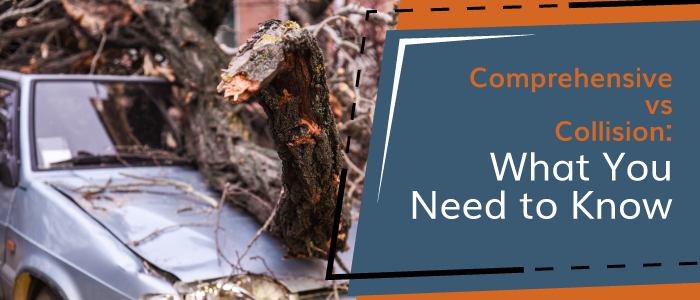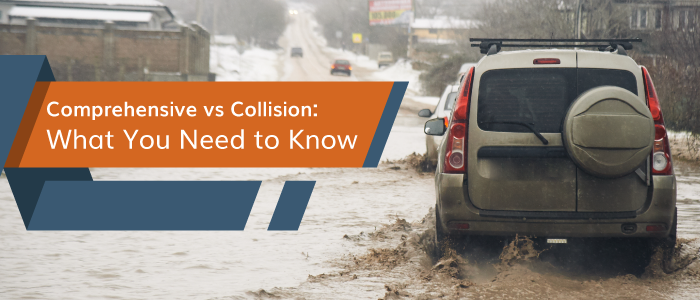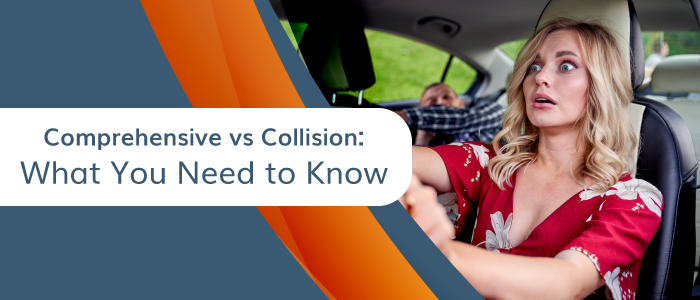Comprehensive vs Collision: What You Need to Know
Comprehensive vs collision are two types of auto insurance coverage. Both offer protection if your vehicle is damaged, but they’re very different.

Many drivers opt for comprehensive and collision insurance even though most states don’t require that level of coverage.
It can pay for the repairs or replacement for unexpected damage to your car.
Overview: what is comprehensive vs collision insurance?
Collision vs comprehensive auto insurance compensates you for damage to your vehicle. In some cases, an outside force like a tree or animal damages your car. Or you may sideswipe an object or bump into another vehicle.
Comprehensive insurance vs collision insurance protection are typically sold together as a bundle. You can opt into both, one or the other, or neither.
But here’s the catch:
Comprehensive vs collision insurance do not cover damage to another person’s vehicle or property or anyone’s medical bills.
That’s what liability insurance is for.
Most states require liability coverage, and it protects you if you cause harm to someone else or their vehicle.
However, lenders will likely require you to purchase comprehensive and collision coverage if you’re financing or leasing your car.
| Collision Insurance | Comprehensive Insurance |
Covers you if…
|
Covers you if…
|
What Does Comprehensive Auto Insurance Cover?
Comprehensive auto insurance protects you from losses due to outside forces that are not a collision.
Comprehensive insurance includes:
- Animal damage
- Theft
- Falling objects like trees or hail
- Natural disasters like a tornado, hurricane, earthquake, volcano, tsunami
- Fire from mechanical failure or set by an outside force
- Damage not caused by another car

What Does Collision Auto Insurance Cover?
Collision insurance covers your vehicle if it is damaged.
It most often involves another car but also includes when you collide with another object like a pole, sign or fence.
Here is what collision covers:
- Collision with another vehicle
- Single-car rollover accidents
- Collision with an object, like a signpost
Differences Between Comprehensive Insurance vs Collision Insurance
It’s easy to mix up the difference between collision vs comprehensive insurance. Comprehensive is sometimes called “other than collision” coverage because it covers incidents that aren’t collisions.
If your vehicle bumps into a tree when parking, you had a collision.
But if a tree falls on your car during a storm?
It’s a comprehensive claim.
Do I Need Collision vs Comprehensive Auto Insurance?
Lenders can require you to purchase comprehensive and collision insurance if you’re financing or leasing a vehicle.
But you may want to consider it even if you own your car outright.
Here’s why:
Suppose you cannot financially absorb the cost of body repairs or the total loss of a vehicle. In that case, comprehensive and collision auto insurance can protect you financially.
So, is it better to have collision or comprehensive?
It depends.
If you have collision insurance, it’s logical to have comprehensive protection, too. Both coverages protect you from paying to repair or replace your vehicle.
You can get both, or you can have one or the other:
- You may want to focus more on collision insurance if you’re not the best driver.
- If your car often sits outside, comprehensive coverage covers you if a tree or hail damages it or if someone breaks into it.
When considering collision vs comprehensive auto insurance, review your policy and rate options.
What’s right for you depends on your situation, your car’s value, your driving habits and where you live.

Can I Have Collision Without Comprehensive Coverage?
Typically, collision and comprehensive are a “bundled” benefit. If you buy one, you usually purchase the other.
Some insurers let you buy the benefits separately so that you can make the best choice for your situation.
Remember: collision and comprehensive insurance cover damage to your car but doesn’t cover damage to another person’s vehicle or any medical bills.
For that, you need liability insurance.
It’s separate from comprehensive and collision and required in most states.
How Much Will Comprehensive vs Collision Insurance Cost?
According to the National Association of Insurance Commissioners (NAIC), the average cost of auto insurance in the U.S. is $1134 per year, or about $94 per month.
Comprehensive vs collision auto insurance can nearly double the cost of your auto insurance.
Here’s how it breaks down according to the NAIC:
- Liability insurance: $611.12 per year
- Collision coverage: $363.08 per year
- Comprehensive coverage: $159.72
What you pay for car insurance can be more or less than the national average. The price of comprehensive and collision insurance varies based on several factors:
- Age of the driver
- Driver’s motor vehicle history (tickets, accidents, claims)
- Average driving daily distance
- Your neighborhood
- The insurance carrier you choose
- Your deductible
How much your car is worth is also a significant factor.
Here’s why:
If your car were totaled or in an accident, the insurer would have to pay more for vehicles with a higher value.
The more your car is worth, the more expensive the insurance costs.

How To Save On Collision vs Comprehensive Insurance
The best way to save on collision vs comprehensive auto insurance is to shop around for cheap car insurance rates.
However, one of the easiest and quickest ways to save on your car insurance is to increase your insurance deductible. The deductible is the amount you pay out of pocket before the insurance kicks in. (For more information, read our “What is a car insurance deductible, and how does it work?“).
Higher deductibles can mean lower premiums.
Also, ask your insurer about discounts.
Many auto insurers have discounts available that can lower your premium even further.
You might save when you insure more than one vehicle, bundle your home and auto insurance with the same company, take a defensive driving course, install an anti-theft device and more.

Comprehensive vs Collision: Is It Worth It?
If you’re debating whether to buy comprehensive vs collision auto insurance, first consider if your lender requires it.
If so, it’s a no-brainer.
But you probably don’t need comprehensive and collision insurance if your car is older and doesn’t have a lot of value.
To know if it’s worth it for you, consider how much your car is worth, if you could afford to replace or significantly repair it if something happened, and the risk of vandalism, severe weather or animal damage in your area.
